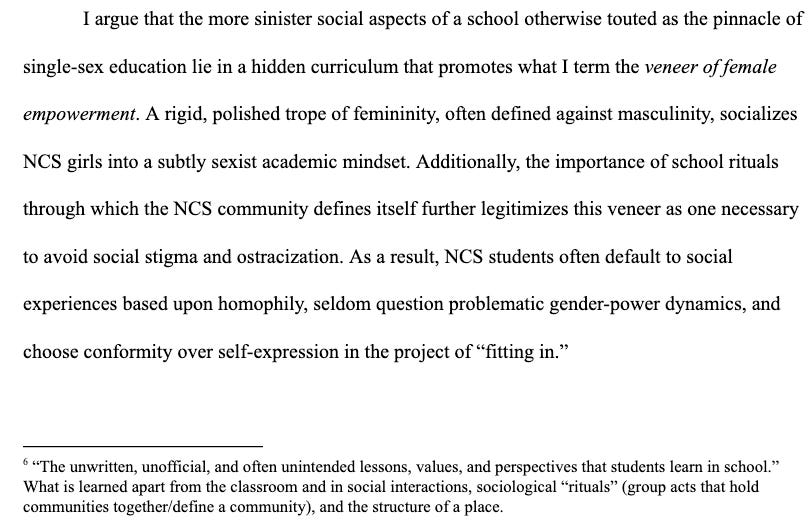The glorious premiere of Euphoria Season 2 has got me thinking about high school, a time I often return to because it was so bizarre. After attending public schools until 9th grade, my parents decided I should attend National Cathedral (NCS), a notoriously expensive and almost exclusively white all-girls private school in northwest D.C.
The school’s official motto is women for the world, i.e. women can do anything, which I quickly realized was at best manipulative, and at worst a lie. Students were policed intellectually and physically, whether that was the 2014 “War on Leggings” (no leggings allowed in classrooms, because god forbid we see legs around here!); skirts and dresses below the knees (no thighs allowed either!); a cap on the number of AP classes we could take that the boys at our brother school across the street were not subject to (too taxing on those delicate feminine minds!). Even the school hymn boasted a lyric about how NCS girls were like the Cathedral’s “gleaming white pillars,” evoking a purity and virginity mirrored in the floor-length white gowns everyone had to wear for commencement (vomit).
The girls were inaccessible and alarmingly wealthy. They had hyphenated first names or two first names entirely (like “Emily Anne”). Many had eating disorders. They carried the same Longchamp totes and wore the same Tory Burch flats. They moved about the hallways with the ease of those who have never had to interact with, or think about, class and privilege. Their parents dutifully attended every endowment meeting, a fact I would point out to my mother, who would snap, “Don’t blame me for working hard so that you can attend that school,” which shut me up real fast. (I didn’t want to expend more mental energy pointing out that it was her decision that landed me there.)
We were too naive and malleable to know then, but the school ultimately groomed women for a patriarchal world where ascribing to white feminism would be sufficient to “get by.” My mother’s friends would often ask her (or, if they felt so bold, me) what it was like to learn such “good graces” and “high class manners” at school. Which was really asking what it was like to have gained such proximity to whiteness. (Implied in the question was how much it cost.) If you sat up straighter, spoke a little milder, disappeared a bit further, could you become one of them?
“The way you talk about high school—you ‘couldn’t speak the girls’ language’—is exactly your parents’ experience immigrating to this country,” pronounced my therapist during one of our sessions. It was such a simple yet incisive observation that I couldn’t believe I hadn’t thought about it that way before. What I remember most amidst desperately trying to fit in—so much so that I would rifle through the lost and found for a discarded jacket or bag that I couldn’t afford—are the colorful moments: reading James Baldwin and Sylvia Plath with my favorite English teacher; teaching piano to my religion teacher’s daughter; falling asleep in the library’s squishy beanbag chairs; tumbling down the Cathedral hill with my friends, the sun blazing overhead.
In Euphoria’s Season 1 finale, Cassie, dressed like cotton candy, asks, “What if these are, like, the big moments in life? My mom always talks about how high school is this big, monumental part of her life. But I cannot imagine being 40 and looking back at this like, ‘wow.’” Maddy, with characteristic bombast, retorts, “Yeah, that’s because most people peak in high school.” The scene reminds me of another lesson from therapy—that in my quest to feel accepted, to be like them, I became far more than someone whose peak was being liked in a pseudo-feminist world I did not want to be part of.
Curious?
Professor Shamus Khan’s Privilege is an excellent study into the cultivation of the new elite in American private schools
I wrote my final paper on NCS for a Sociology of Schools class, which you can read here. Still proud of how this one turned out :-)
Lately (Recommendations)
“It’s Time to Embrace Slow Productivity” and “An Understanding of Millennial Asian Taste at Hupo” from The New Yorker
“Changing Behavior, Not Beliefs” from Hidden Brain
“Softbois, Nice Guys, and Incels: Petulant Vulnerability is the New Toxic Masculinity” from The New York Times
“They came, they saw, they reckoned?” from Code Switch
Jay Caspian Kang’s The Loneliest Americans








Great piece Cindy! I feel like you illustrated your perspective very well, and although my experience was different for plenty of reasons, I understand a version of wanting desperately to belong and getting most of my joy from my English class